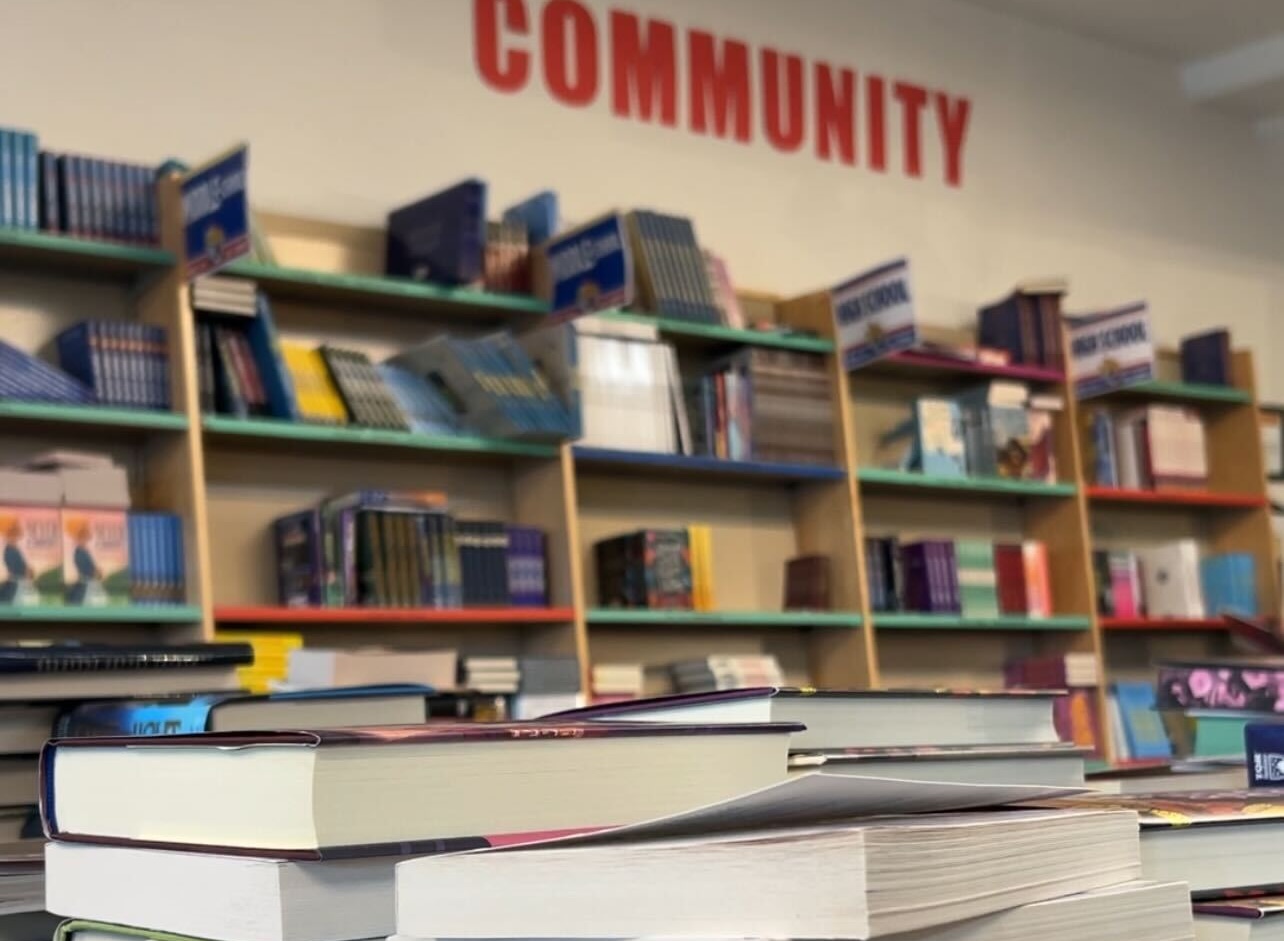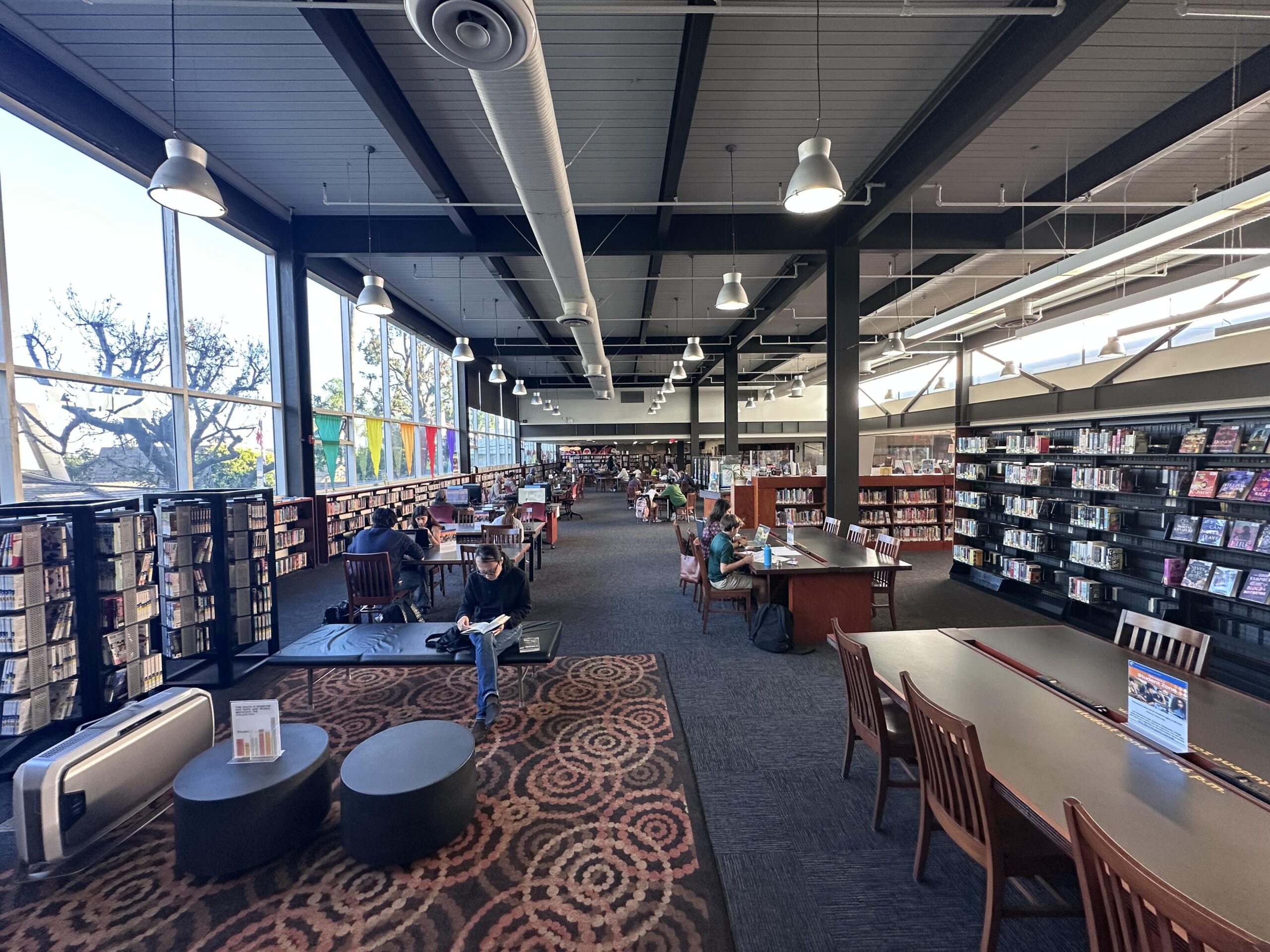Feature Writing with Julia Dahl [Photo from Lindsay Rogers]
When Adam Penenberg launched the first completely online master’s degree within the Graduate School of the Arts and Sciences at NYU in 2019, there was no way he could predict what the first cohort of the program would experience in their first year.
In March 2020, a global pandemic upended every aspect of life — work, family, school. That the program was already conducted remotely didn’t take away from some of the challenges this first class met during a tumultuous year: a racial reckoning, social unrest, a historic election, a struggling economy, the loss of hundreds of thousands of lives from an uncontrolled pandemic.
Like many journalists across the country, they persisted and managed to continue to report remotely, conduct investigations, and learn how to write from successful practitioners in their respective fields. In other words, the Class of 2020 did it. They graduated and they succeeded.
The Click spoke with some of the graduates, their classmates still in the program, and the professors who taught them. What will they remember most? What friendships have they made? What’s a fun or fond memory, the most important thing they learned, or advice they have for future students?
CALEB BLOOMFIELD:
My classmates and I, my fellow “day ones” as I call them, saw each other through the transition from normal life to living, and reporting, in a pandemic. Before I started the program in September 2019, I thought, “How personal can this truly get?” Since then, I’ve forged incredible relationships with my classmates, as we received invaluable lessons from our instructors. They served as a support system during some of my toughest times, whether they know it not. So cheers to you, my fellow day ones. I’m so fortunate to know all of you and I can’t wait to see what we all have in store. We made it together!
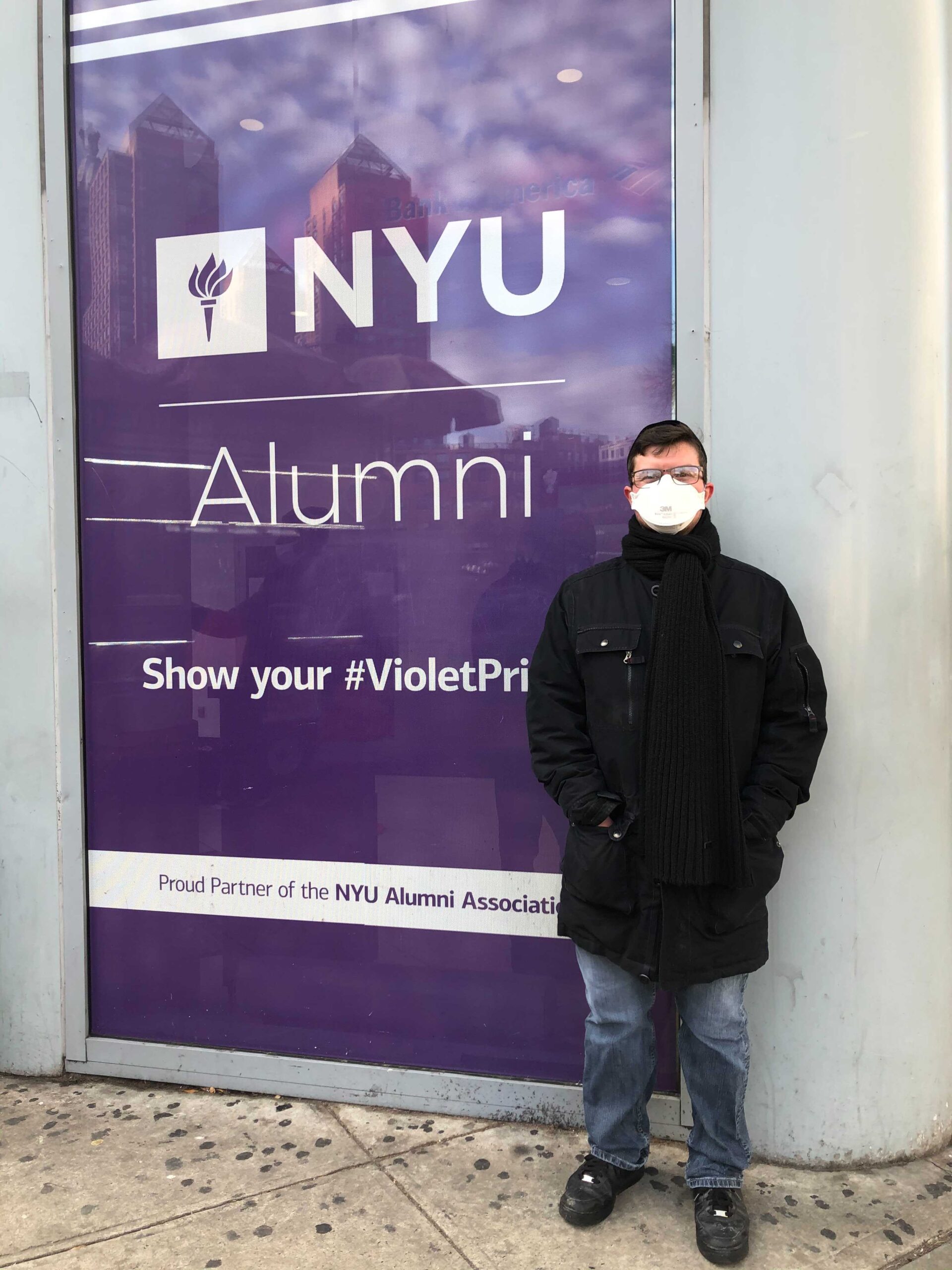
Caleb Bloomfield, now an alumnus of NYU [Photo from Caleb Bloomfield]
Almost immediately, this program showed me that it was a great choice for me, immediately getting into the skills that I wanted to strengthen as a working journalist. I didn’t expect that it would also give me a wonderful group of peers and mentors who have helped me grow in a lot more ways and who have been such an important part of navigating a very difficult year. I’m so happy to have made meaningful friendships in this program, and to be able to be part of a group that gives so much support to each other as we all leave this program very different — more skilled and more confident — than when we arrived.
MICHAEL HALEY:
What I will remember most from the NYU AJO program is all the talented journalists I connected with in and out of class everyday. From our excellent professors, fellow students as well as guests to our class — I always felt engaged and among like-minded people who love thoughtful conversations and are just as curious as I am. Great piece of advice I was given came from Longform Narrative professor Brendan Koerner and it is simple: “Write every day.”
MEGAN JARRETT:
One of the most important things I learned in the program was to find my story and to tell it. I came in without a background in journalism and my amazing professors and classmates really helped me build my confidence to tell my stories in my way. I can’t overstate how big of an impact they had on my writing but also my storytelling. No two journalists are the same or have the same stories to tell, and so much of this program for me was learning how to tell MY stories, not someone else’s. That was revolutionary for me.
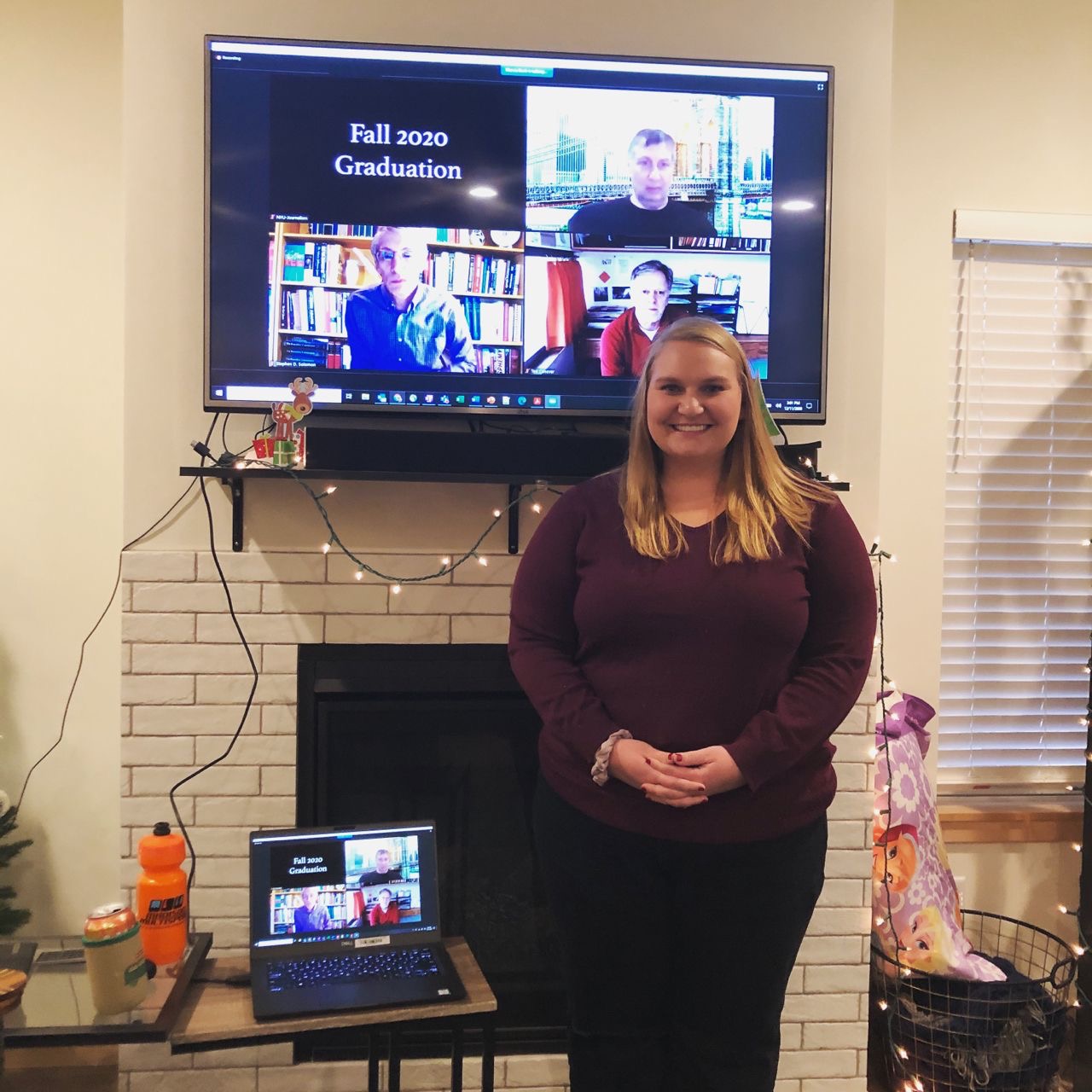
Megan Jarrett in front of the Zoom virtual graduation ceremony. [Photo from Megan Jarrett]
I never could have guessed when I was admitted to the program in August of 2019 what it would come to mean to me. I’ve had the chance to work with, learn from, and befriend so many incredible journalists, for which I am eternally grateful. I’m excited for this next chapter, and equally excited for the relationships I’ve forged to continue and evolve outside the (virtual) walls of NYU. My advice to current and future students is this: Ask for help, don’t be afraid to show vulnerability, and stand by what you do. Lastly, enjoy this time with your classmates — it goes so quick — and never pass up the opportunity to celebrate each other’s victories. My favorite thing still, by far, is coming across an OG’s byline out in the world.
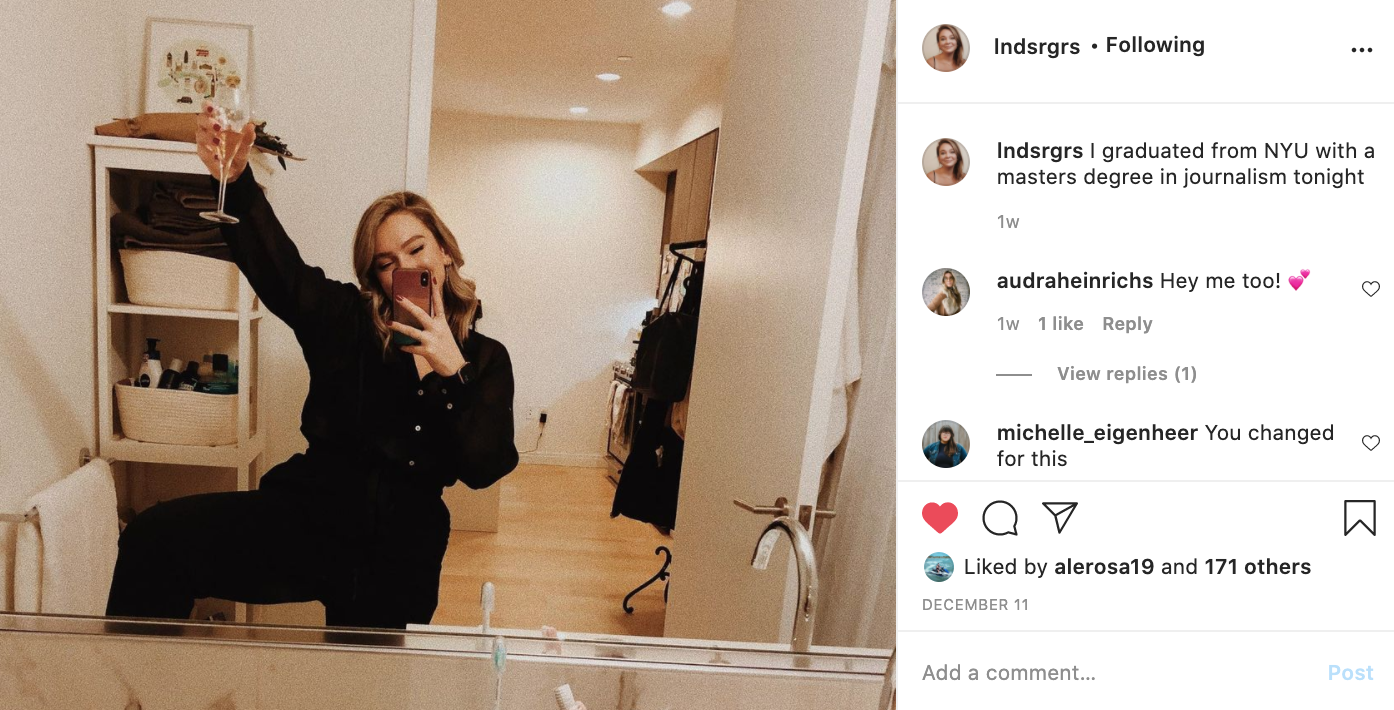
Lindsay Rogers celebrating on Dec. 11, graduation day [Photo from Lindsay Rogers]
I can’t believe how close I became with my classmates, even though we live thousands of miles away from each other. Online classes are amazing for building relationships. Unlike a traditional classroom where you end up staring at the back of your classmates’ heads, on Zoom you’re looking at everyone’s faces. It creates a conversational environment akin to a round table. I’ve made lifelong friends in the past year and a half. I am so grateful to be a part of the inaugural class for this online masters program and I can’t wait to see where everyone’s careers go from here.
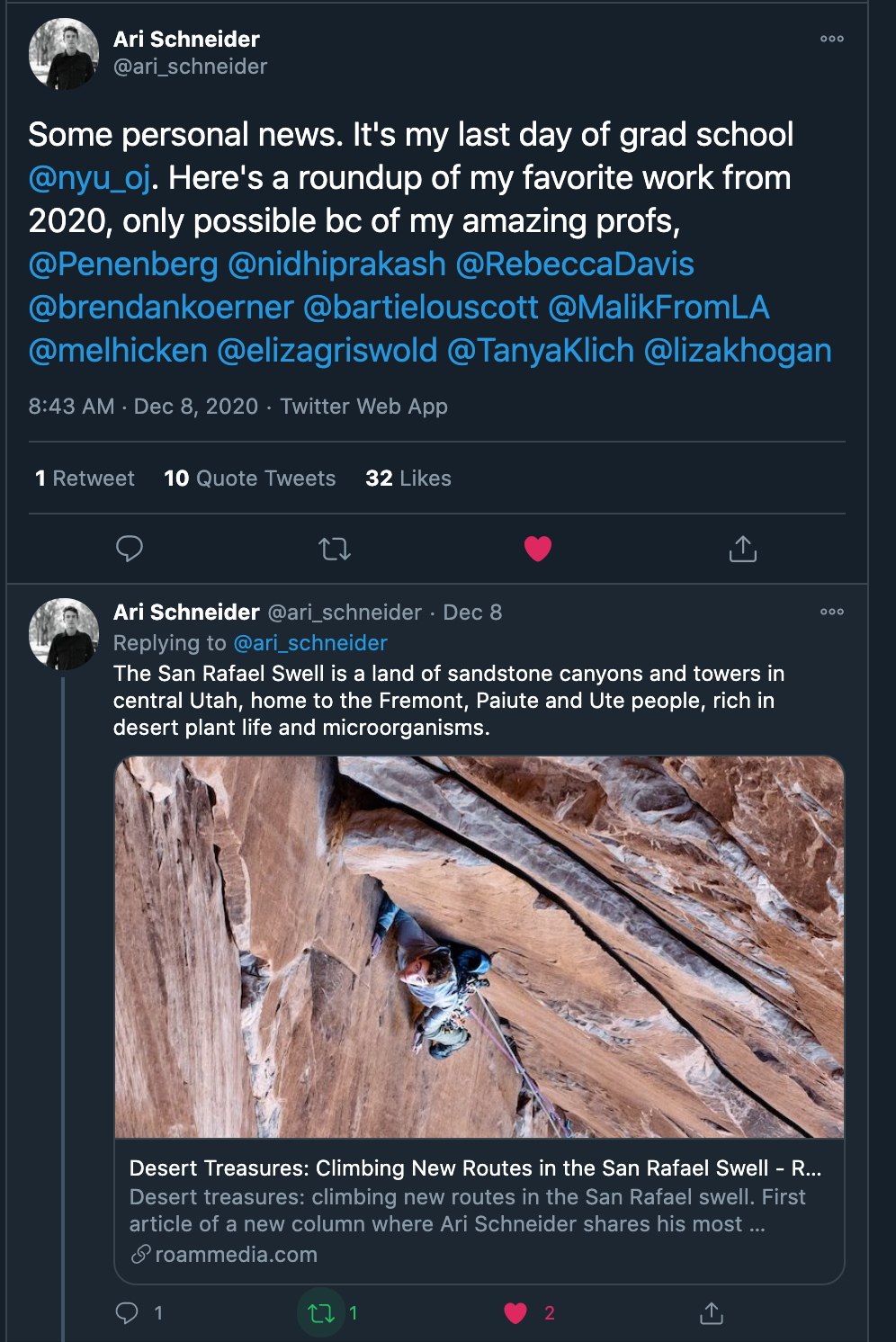
Part of Ari Schneider’s farewell tweet [Photo from Ari Schneider]
1st Cohort Students, Future Graduates
NASIA COLEBROOKE:
To my inaugural classmates, congrats!!! I am so glad to have met all of you and I know you will all go on to do GREAT things for this crazy world we’re living in! To Zak, Caleb, Michael, Ari, Megan and Alejandro especially, I love y’all and I’m gonna miss all our in-class jokes but I’m glad we all connected on social media! All the best to you!
RICHARD DICICCO:
I’m grateful that I was able to share so many classes with Lindsay Rogers throughout this program. She’s got a great sense of humor and remains refreshingly honest. I always appreciate how Lindsay is eager to hear insight and opinions from her peers. I’m really going to miss her at NYU, but I look forward to the day we can meet in person as professionals!
CHRISTINA MACGILLIVRAY:
Even though the program has been remote, we have made great friendships. I’m excited to see what everyone goes on to accomplish.
HANNAH SPARKS:
There’s a camaraderie between the group that folks outside don’t immediately assume about the program. I think part of the reason has a lot to do with the fact that we feel a certain responsibility to help carve the program, and live-remote learning as the new frontier of a more egalitarian approach to higher education (aside from the issue of tuition exorbitance, of course). So, I’m always going to remember — and milk for all its worth — the opportunity I had to be a part of that: our part in an effort to make school more accessible and rewarding for students.
Last semester I took Feature Writing with Eliza Griswold, the same semester the pandemic hit. The class had only five students. It was sort of like a trauma bonding experience, but also so grounding after society’s upheaval. We had all been sent home from our jobs, but still had the same weekly meeting online.
I really look forward to calling my classmates professional colleagues. They’re already done such awesome work and scored really impressive bylines. ****I haven’t yet met up with any of them yet in-person, but I plan to visit Nasia in the Bahamas ASAP and hope Christina MacGillivray will let me tag along with her on a reporting trip to India some time. I’ve got a long way to go so I hope to make many, many more.
This experience has been a privilege so far. I have to thank Adam for dreaming up the program. If it were for this, I’d never have a shot at grad school.
![Longform Narrative Class [Photo from Garnette Cadogan]](https://theclick.news/wp-content/uploads/2020/12/Screen-Shot-2020-12-20-at-9.04.48-PM.png)
Longform Narrative Class [Photo from Garnette Cadogan]
GARNETTE CADOGAN:
We always begin in joy—class opens with a ripple of smiles and laughter that grow in amplitude, and by the end our conversation is punctuated by roars of laughter—and it’s always joy that frames our times together. Class would end, but we’d remain to talk about our work, our favorite songs, our interests that found echoes and invited curiosities in each other. Some of these after-class moments would be a mini dance party, with Cher (a favorite of Michelle’s), Backstreet Boys (a favorite of Zak’s), Dolly Parton (a favorite of Audra’s), and some ‘80s song I love that would make everyone question my taste in music.
But it wasn’t all play — this was an incredibly hard-working group, working hard to listen to each other, to listen to the people in their stories, to listen to voices on and off the page, to listen to (and ignore) the perfectionist or doubting voices in their heads. And out of all their listening came drafts and revisions that improved by leaps and fantastic bounds over the arc of the semester, taking in the insights gained from research and reporting and editing — from attentive and generous listening—and thinking about the reader. Here was a class in which everyone was on the side of the reader, and ready to support and encourage each other to be the best writer they could be by being the best listener they could be.
And they were not there just to learn from each other and from me — they generously taught me how to create a caring, supportive environment; they reminded me and demonstrated powerfully the value of silence and of creating room for people to share words as well as not have them interrupt a mood or atmosphere or set of complex emotions; they ensured that I saw the value of teaching the people in the class more than teaching the syllabus. They also demonstrated how much courage could be cultivated through support and why it’s an ingredient worth drawing out and encouraging — after all, a good story is often one in which you have to resolve to speak honestly and prepare for blows.
What words of wisdom could I possibly have for people who have shown such searching intelligence and capacious generosity in the times we’ve learned together? I’d like them to remember that they have many many more stories to tell, and that the stories are always around the corner. (Just in case they were worried that, post-graduation, they’ve become emptied of ideas or energy). I know no better way to encourage them to remain open than to turn their attention to the words of Naomi Shihab Nye in, “The Story, Around the Corner.”
The future might seem overrun with uncertainties, but I hope they will never forget that it’s also bursting with possibilities, and that they should continue to listen — because, of course, stories will continue to walk up to their doors and knock. And, I’m sure, they have what it takes to be ready to follow and explore and share those stories, and always be the storyteller on the side of the reader.
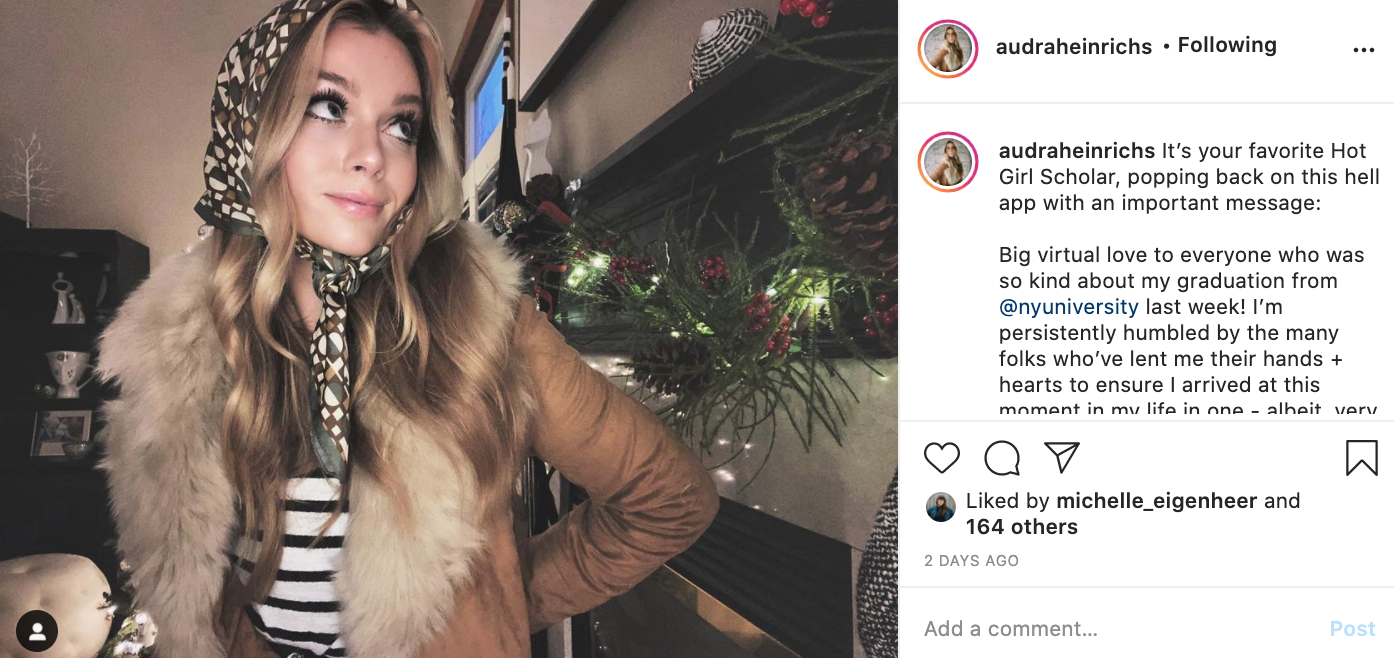
Audra Heinrichs in her graduation post on Instagram [Photo from Audra Heinrichs]
REBECCA DAVIS:
I’m incredibly proud of this first cohort of graduates. Seeing how everyone rose to the great challenge of reporting under the circumstances of a global pandemic — and for some in the global epicenter of that crisis, New York City — was truly inspiring. I have great confidence in these graduate’s future success after seeing how everyone persevered to create incredibly impactful work during this very difficult year. I’m so looking forward to following all the new grads, no longer as their teacher, but as a fan and colleague!
JONATHAN HARBER:
To the graduating class — Find your truth, follow your passion, enjoy your journey. Congratulations!
![Lauren Gadol, one of the first graduates of the program, in her Instagram post [Photo from Lauren Gadol]](https://theclick.news/wp-content/uploads/2020/12/Screen-Shot-2020-12-24-at-10.59.08-AM.png)
Lauren Gadol, one of the first graduates of the program [Photo from Lauren Gadol]
Lauren Gadol: Lauren was, in her own words, “the baby of the group” — the youngest student in my class by at least several years. But despite her youth, she was entirely up to the task: She’s an incredibly hard worker with a genuine passion for journalism and an energetic ambition to match. I have no doubt she’ll be soaring into the stratosphere in the years to come.
Stephanie Leone: When Stephanie first proposed writing her final project about her Cuban uncle, I was skeptical: It’s pretty easy to get lost into the weeds when writing about your own family’s history. But, wow, did she ever prove me wrong — her story was my favorite of the semester, a beautifully reported meditation on what it means to be American, and how to live with the burden of regret. I can’t wait to see what she does next.
Caleb Bloomfield: It was such an incredible joy to bear witness to the evolution of Caleb’s storytelling skills. He has a nose for a great tale and a willingness to challenge himself — the project he took on, about a Black Lives Matter march in a scarlet-red corner of Louisiana, was one of the toughest in the class. He attacked the story with such admirable zeal and empathy, and wrote something truly moving.
Lindsay Rogers: From day one of class, Lindsay knew the story she wanted to write: A contrarian look at the effects of cannabis legalization on society, built around a truly harrowing first-person experience. Watching that project evolve from its first iteration to its last was one of the great joys of my 2020. I was amazed by Lindsay’s willingness to listen to constructive criticism, and then her ability to incorporate my comments into her successive drafts so that each one was stronger than the last. I’m so proud of what she achieved.
Michael Haley: Michael chose to tackle a maddeningly complex story about a Philadelphia real-estate agent turned drug dealer. I feared that he’d bitten off more than he could chew, but I needn’t have worried: The man is a dogged reporter who managed to track down details that made the piece sing. I appreciate all of the hard work he poured into the class, and I know that we’ll be saying his byline atop some explosive true-crime yarns in the years to come.
Alejandro Rosa: At the beginning of the semester, I challenged Alejandro to push himself out of his comfort zone — to attempt a kind of storytelling that his day job rarely gives him an opportunity to explore. He came through with a deeply personal final project about the pressures faced by unhappy pre-med students — a moving and timely tale in this age of pervasive status anxiety. The fact that he managed to do this while also moving cross-country in the middle of a pandemic is worthy of tremendous awe.
Ari Schneider: Ari has an innate professionalism that I admire to no end: This is a man who is determined to become a major journalist, and I have no doubt that his grit and talent will help him attain that goal with ease. He did a brilliant job of combining old-fashioned investigative journalism and empathetic storytelling in his final project, about a teenager who lived through the hell of a wilderness camp for troubled youths. I’m still haunted by that piece, and I’m thrilled to know that it’s only the beginning of a standout career.
Megan Jarrett: There’s such a deeply human quality to Megan’s reporting and writing: You can tell from the first page that this is a woman who genuinely cares for her subjects, and who understands how their stories can teach us about the grandest themes in life. I hope she keeps honing her craft over in merry ol’ England! The world needs more journalists like her.
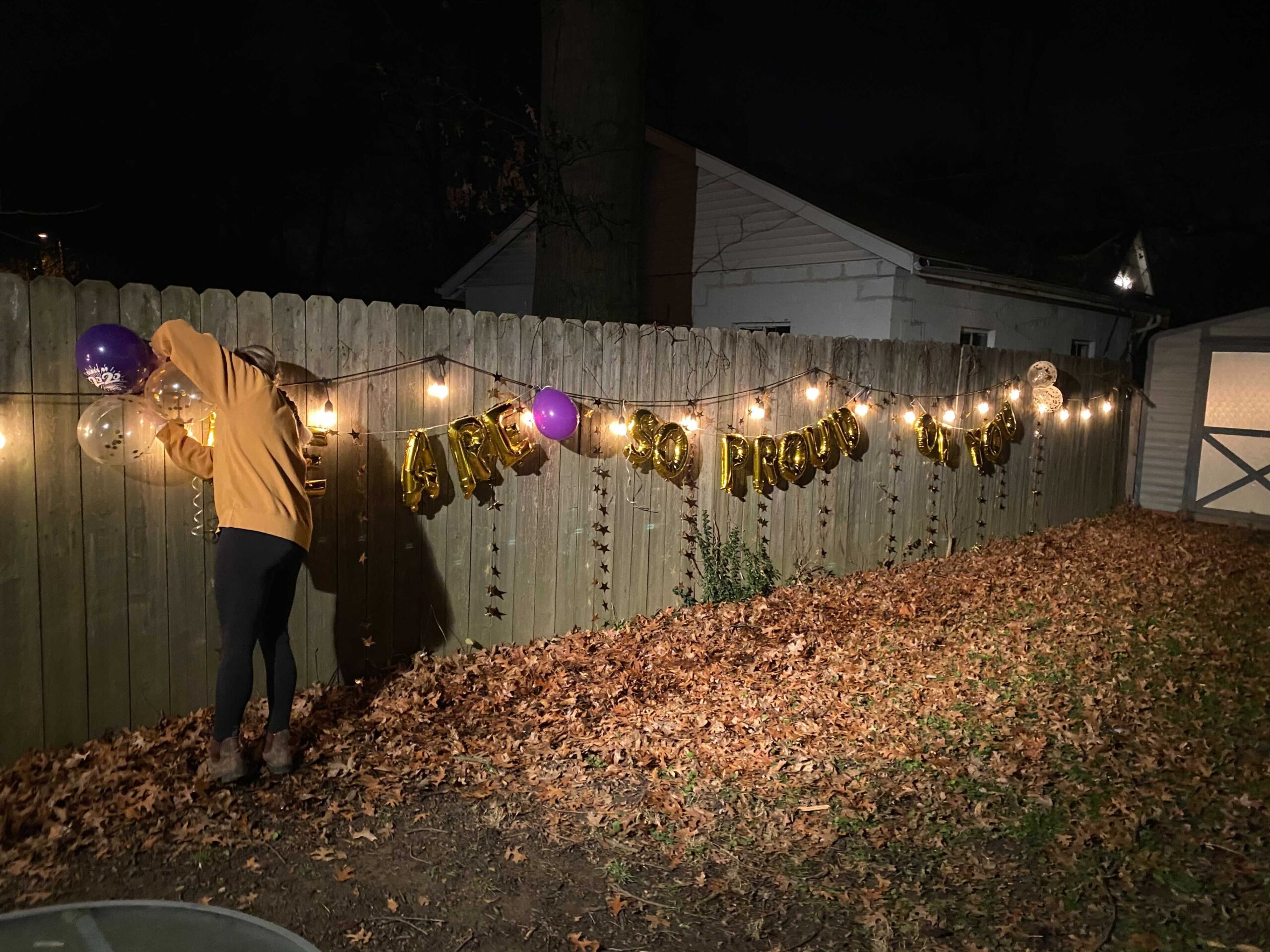
A socially distanced surprise party for Michelle Eigenheer in Louisville, Kentucky [Photo from Michelle Eigenheer]
Stephanie, Lauren, Zak, Audra, Caleb, Lindsay, Michael, Alejandro, Ari, Megan, Michelle: CONGRATULATIONS!!!!! You are the first graduates from The American Journalism Online Master’s Program at NYU. You took a chance on a fledgling program, and for that you will always hold a special place in our hearts. A combination of courage, hope, trust, intelligence, intelligence, an unwavering adherence to the highest ethics and TALENT, you exemplify the kind of students we want in our program. You are trailblazers, early adopters, and tenacious defenders of the truth. You will go far no matter where your lives and careers take you. Stay in touch. You are key members of the AJO extended family. And know this: We are here for you, no matter where you are or what you do.
